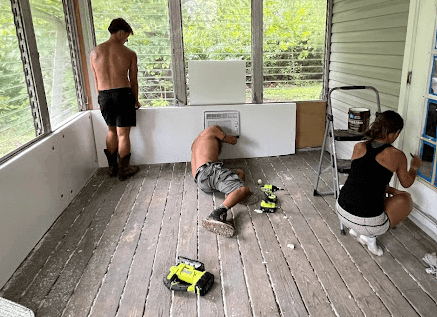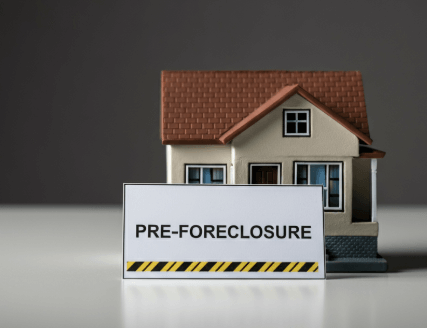What is a pre-foreclosure in Florida? A pre-foreclosure in Florida happens when a homeowner misses mortgage payments, and the lender starts the foreclosure process before auctioning the property. This blog article sheds light on the intricacies of pre-foreclosure in Florida, offering valuable insights, practical tips, and expert strategies to help you successfully maneuver through this challenging phase. Read on as we explore things from the definition of pre-foreclosure to effective strategies for dealing with it.
In the realm of real estate investment, Steve Daria and Joleigh have carved a niche for themselves as knowledgeable experts in navigating pre-foreclosure properties in Florida. Their insights into this unique market segment highlight the importance of understanding the timeline and legal implications involved in the pre-foreclosure process. By leveraging their experience, they assist both investors and homeowners in making informed decisions during this critical stage of property ownership.
What is Pre-Foreclosure?
Pre-foreclosure is an important phase in the foreclosure process, marking the period when a homeowner begins to face the risk of losing their property.
This stage starts when the homeowner has missed mortgage payments, usually falling behind by 90 days or more.
During pre-foreclosure, the lender formally notifies the homeowner with a Notice of Default (NOD), signaling that the foreclosure process has officially begun.

However, the property has not yet been repossessed or sold at auction, meaning the homeowner still has time to address the default.
Key Aspects of Pre-Foreclosure
Pre-foreclosure in Florida has several aspects:
- Notice of Default (NOD): Issued by the lender after a homeowner misses multiple mortgage payments. Indicates the beginning of the pre-foreclosure process.
- Grace Period: Offers homeowners a chance to settle debts and avoid foreclosure. Typically lasts 90 days but can vary.
- Impact on Credit: Affects the homeowner’s credit history. This makes it more challenging to obtain future loans.
Why Does Pre-Foreclosure Occur?
Pre-foreclosure typically occurs due to a range of financial difficulties that prevent homeowners from keeping up with their mortgage payments.
Common causes include job loss, medical emergencies, divorce, or significant debt, all of which can strain financial resources and lead to missed payments.
Recognizing these underlying issues can help both property owners and potential buyers understand the context of the pre-foreclosure and make more informed decisions regarding resolution or investment.
Common Causes
- Financial Hardship: Job loss or reduced income. Medical expenses or unexpected bills.
- Economic Downturn: Decline in property values. Increased interest rates.
- Poor Financial Planning: Overborrowing against home equity. Mismanagement of personal finances.
Get An Offer Today, Sell In A Matter Of Days…
How to Identify a Pre-Foreclosure Property
For real estate investors and buyers, identifying pre-foreclosure properties can present lucrative opportunities.
- Public Records: Check county records for Notices of Default. Look for properties listed under “pre-foreclosure” status.
- Online Databases: Use websites specializing in foreclosure listings. Filter results to find pre-foreclosure properties in Florida.
- Real Estate Agents: Collaborate with agents who have expertise in distressed properties. Gain access to exclusive listings and insider knowledge.
Strategies for Property Sellers in Pre-Foreclosure
If you find yourself facing pre-foreclosure in Florida, it is crucial to act swiftly and strategically.
- Communicate with Your Lender: Negotiate a loan modification or repayment plan. Seek forbearance agreement to pause or reduce payments temporarily.
- Sell Your Property: List your home with a real estate agent experienced in pre-foreclosure sales. Consider a short sale if your home’s value is less than the mortgage balance.
- Seek Professional Help: Consult a foreclosure attorney for legal advice. Work with a financial advisor to explore all options.
Tips for Buyers Interested in Pre-Foreclosure Properties
Purchasing a pre-foreclosure property can be a savvy investment if approached correctly.
- Conduct Thorough Research: Investigate the property’s history and current status. Ensure there are no hidden liens or unresolved legal issues.
- Get Pre-Approved for Financing: Secure a mortgage pre-approval to streamline the buying process. Demonstrate your financial readiness to sellers.
- Make a Competitive Offer: Present a fair and attractive offer to the seller. Be prepared to negotiate terms and conditions.
Advantages of Investing in Pre-Foreclosure Properties
Real estate investors often seek pre-foreclosure properties for their potential benefits.
Lower Purchase Prices
Pre-foreclosure properties often come with lower purchase prices compared to market value, offering significant savings for buyers.
This reduced cost can increase the potential for higher returns on investment, especially if the property is renovated or sold at a higher price later.
Less Competition
Fewer buyers are typically interested in pre-foreclosure properties compared to traditional real estate listings.
This lower level of competition can provide buyers with better negotiating power and more opportunities to acquire properties at favorable terms.
Opportunity for Customization
Purchasing a pre-foreclosure property allows buyers the opportunity to renovate and personalize the home according to their own preferences.
Enhancing and improving the property can significantly increase its market value, leading to a higher resale price or greater enjoyment of the home.

Challenges of Dealing with Pre-Foreclosure
Dealing with pre-foreclosure in Florida can be challenging due to potential hidden issues.
- Legal Complications: Navigate the complex foreclosure laws in Florida. Ensure compliance with all legal requirements.
- Property Condition: Assess the property’s condition and necessary repairs. Factor in renovation costs before making a purchase.
- Time Sensitivity: Act quickly to capitalize on pre-foreclosure opportunities. Be prepared for fast-moving transactions.
Frequently Asked Questions
Understanding the nuances of pre-foreclosure can be challenging.
Here are some common questions and answers to help clarify the process.
Can I Stop Pre-Foreclosure?
Yes, it is possible to stop pre-foreclosure by addressing missed mortgage payments promptly.
Homeowners can often negotiate with their lender to arrange a payment plan, loan modification, or other financial solutions to bring the account current.
How Long Does Pre-Foreclosure Last?
The pre-foreclosure period typically lasts about 90 days, but this can vary depending on the lender’s policies and state regulations.
During this time, the homeowner is still able to make arrangements to address the missed payments and avoid further legal action.
Is Buying Pre-Foreclosure Properties Risky?
Buying pre-foreclosure properties carries certain risks, such as potential hidden liens or unresolved legal issues.
However, conducting thorough research, including title searches and property inspections, can help mitigate these risks.
Conclusion
Pre-foreclosure in Florida presents both challenges and opportunities for property sellers, buyers, and investors. By understanding the process, identifying pre-foreclosure properties, and implementing effective strategies, you can navigate this phase successfully and positively.
**NOTICE: Please note that the content presented in this post is intended solely for informational and educational purposes. It should not be construed as legal or financial advice or relied upon as a replacement for consultation with a qualified attorney or CPA. For specific guidance on legal or financial matters, readers are encouraged to seek professional assistance from an attorney, CPA, or other appropriate professional regarding the subject matter.

